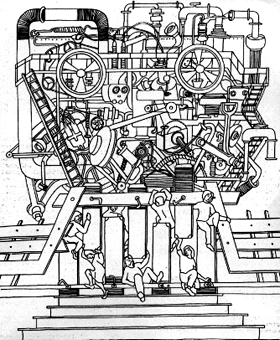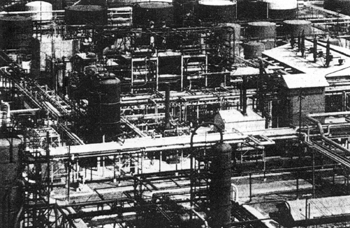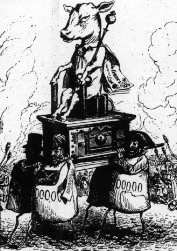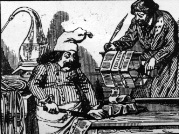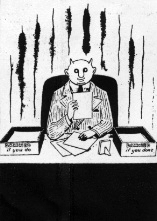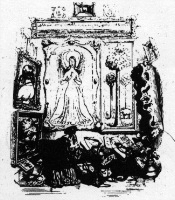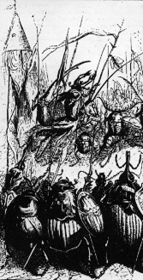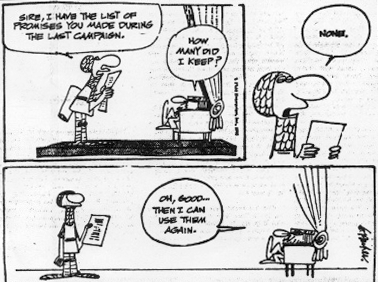|
The Destructive Urge By Mario Cutajar
Demystification can be construed as a terrorist practice. The desire to reduce illusions to ashes proceeds from both a hatred of illusion and the sheer aesthetic joy of witnessing the conflagration. For the hatred for the bourgeois is aesthetic as well as moral. The bourgeois is a pig not just because he exploits but even more so because he is bourgeois, a conceited bastard who refuses to recognize the utter contingency of his existence and social position, a man who believes he is as neccessary to the universe as the law of conservation of energy. "The selfish misconception that induces you to transform into eternal laws of nature and of reason, the social forms, springing from your present mode of production and form of property - historical relations that rise and disappear in the progress of production - this misconception you share with every ruling class that has preceded you." Marx's statement is meant to be more than a philosophical observation. It is at the same time a declaration of war since the bourgeois is only proved to be conceited if he is actually made to disappear. Having escaped the anguish of his freedom by pretending to be a manifestation of the eternal he is reintroduced to his anguish through the naked strength of the revolutionary movement. Revolt thus begins as the affirmation of contingency, as an urge to test things by trying to break them. All we know in the beginning is that the world of the bourgeois is a fabrication. For our part we yearn for the concrete and the concrete is what doesn't burn, the ashes left after the fire. Thus Marxism begins as the "ruthless criticism of everything existing." The spirit of revolt makes its first appearance as nihilism. Nihilism is the beginning. It is therefore infantile in both senses of the word: it is both an unavoidable first step and inadequate as a permanent relation to the world. We have as yet only an automatic reaction to a vague yearning for the real. Between yearning and gratification there is not rational mediation. The yearning itself is left unquestioned, shielded from the "ruthless criticism" that it subjects everything else to. At some point this blind search of the real must become aware of its blindness. Childhood stands outside itself and recognizes its inadequacy. Prolonged beyond this point nihilism, like childhood, becomes grotesque, its original youthfulness turned into a pathethic mimicry of itself. "Thus nihilism must either degenerate or else mature into a genuinely revolutionary attitude."
Thus nihilism must either degenerate or else mature into a genuinely revolutionary attitude. Philosophy proceeds in the same way: the process of doubt must at some point become a process of discovery. The skepticism which liberates us from our illusions must give way to the more arduous but fruitful investigation of experience. Else it becomes an excuse for new illusions. In a similar fashion nihilism by refusing to situate the urge to destroy within a context of conflicting possibles avoids the risk of failure that must attend any project undertaken in the real world. In a backhanded way it eliminates the contingency it pretends to celebrate.
The revolutionary attitude on the other hand demands that the urge to destroy be subsumed within the project of creation. Bakunin's equation of the two (the urge to destroy is a creative urge) is simply bad faith; an attempt to avoid the dirty task of transforming one into the other. The urge to destroy has to become the urge to create and the urge to create has to become a conscious project. An urge becomes a project when it takes cognizance of the resistance the world offers to it and attempts to define its goal as the object and conclusion of a calculated plan. The plan is never final, of course, but the attitude of planning is always there: the world is viewed as a heterogenous mixture of obstacles and tools, allies and enemies. The plan is never final, because one's actions change the world constantly necessitating a fresh estimation of probabilities with every step. The project contains within it the possibility of its failure; that is why it is a project, a leap towards an object. Planning does not remove this possibility, it merely attempts to reduce it starting first and foremost with the act of planning itself which translates the undifferentiated resistance of the world into an obstacle and thus into a lack of tools. By virtue of this simple operation the resistance offered by the world becomes overcomable since the obstacle at least defines the tools for its overcoming. These may not be available but at least the task of fashioning them or discovering them (although stone is both a stone and a potential hammer head) is a practical one.
The creative attitude may thus be defined as an instrumentalizing approach to the world. This is not the same thing as the technocratic approach. Creation demands recognition of the free consciousness behind the project. Which project to undertake and what means to use in order to objectify it remain forever open questions. By contrast the technocrat sees the project as a given, something which in a sense already exists since it does not originate in any human currently living but rather something imposed by the future on the present. Production has to be doubled, socialism has to be "built": the plan rules.Within the creative project, however, the plan itself always remains an instrument, the unification of all other instruments. Paradoxically by denying the human authorship of the plan, its arbitrariness, technocratic reason dooms itself to irrationality, to a permanent discrepancy between the plan and reality. Instruments only exist in the presence of an instrument-maker, a being who can make of himself an instrument but is always more than just an instrument, a free consciousness. Once this being is obliterated. instruments return to their inert state, the hammer-head resumes its existence as a stone. Likewise the technocratic plan fails the moment it ceases to be an instrument and starts to rule. Production is doubled and tripled but socialism is never built. "Instruments only exist in the presence of an instrument-maker, a being who can make of himself an instrument but is always more than just an instrument, a free consciousness." The creative attitude takes the instrumentalizing of the world to the limit and regards itself as another instrument. Men make history but they make under circumstances that existed prior to their being in the world. The recognition of both circumstances and one's ability to change them is the meaning of instruments. They are, if you like, the ever-renewable traces of the meeting between subject and object. Within this context nihilism emerges as the other side of the technocratic approach. Ultimately both deny the existence of an instrument maker. The technocrat does it by giving instruments autonomy. Nihilism achieves the same thing by denying the very existence of instruments. We started by giving nihilism the status of a genuine need. We recognized in it the unavoidable beginning, the first attempt at appropriating reality. These first trashings about are not without result. The resistance they meet and against which they are directed elucidates the structure of reality while at the same time illuminating the as yet uninterrogated urge to destroy. The analogy with childhood provides further insights into this process. Childhood reveals enough of the world to force its own transcendence, the "loss of innocence". But this loss can be experienced or adapted to in two ways. What one has learnt can be used to postpone adulthood indefinitely or it may form the basis for maturity. In each case the break with childhood is unavoidable but how it is lived, as infantilism or maturity, is a choice.
Nihilism proceeds in this manner. Its yearning for the real is fulfilled. The world is revealed and with it the fact of its inhabitation. Reality, it turns out, is social. One's urge to destroy contradicts or reinforces the urge of others. But this discovery of the projects of others immediately deflates one's own urge. The urge to destroy so far accepted as a given is revealed as a choice. The urge to demystify must itself be demystified. In the processing of exposing others to their own contingency one learns the contingency of oneself. The primacy of the urge even if the urge is to destroy is revealed as an escape from contingency, a denial of one's freedom. Or to put it more simply, to be "ruled" by any passion is no more than an attempt to escape the necessity of choosing which particular passion to be "ruled" by. Hatred for the bourgeoisie is no more "natural" or inevitable than is the existence of the class one hates. Nothing can "rule" my life, not even the revulsion I feel for those who in practice do run my life. This revulsion too is my creation as we discover in those moments of self-doubt when we feel we are taking things "too seriously". We look to our feelings to take over the automatic guidance of our lives only to discover that the moment these feelings are charged with this responsibility they collapse under its weight. I choose to be a revolutionary and to let my hatred for the bourgeoisie sustain me but there come days when my hate seems exhausted, when I can contemplate not being a revolutionary without the slightest feeling of guilt. In such moments I conjure to myself all the things that usually make me angry. I say to myself "Remember imperialism, remember your own frustrations, recall the smug faces of the pigs and the nauseating toadying of the press." My rage creeps back and once more I'm a revolutionary "as I cannot help but be". I evade absurdity. Christians are deeply aware of this process. They recognize that religious fervour, the "losing of oneself in God", is an exotic experience that in everyday life one has to rely on faith, a conscious commitment. The same can be said of long-time lovers. Indeed I have the same experience as I write this article: the frenzy that moves me to write sometimes fails me and I have to continue in an arduous and deliberate manner until the next bout. Absurdity or anguish are thus the proof of freedom.
Thus nihilism, which starts as the affirmation of freedom, must in order to maintain this affirmation go beyond itself. The passion that drives me to reject the obscene self-deception of the bourgeois otherwise becomes my own self-deception, my own way of establishing a "place in life" as secure and eternal as that of the bourgeois. If I overcome nihilism I face the difficult incompletable task of constructing a revolutionary project. I subject myself to the constant uncertainty that goes with any project. Each step of the way it is necessary to make choices that are in themselves never necessary. How is capitalism fought? Should I join a party? If so which one? If not what do I do? Do I start my own party or do I act on my own? How can I be most effective on my own? These questions are necessary, I cannot avoid asking them. But each particular answer is never the necessary answer. The choice not to join a party is never final as is any other choice. But I can also choose to deny the necessity of choosing. This is bad faith, a deliberate confusion of one necessity with another. Because it is true that each particular choice is not necessary but choice itself is not a choice. In bad faith I claim for myself a freedom I actually do not have - the freedom not to be free -so as to better suppress the freedom I do have. This is what it means to make nihilism a profession. The damnation of others becomes my own salvation, my own way out of freedom. I jeer at the bourgeois, the bureaucrat and the Leninist even as I make of my jeering a safe occupation. I attack others for stifling freedom while I stifle it in myself. Earlier we noted that nihilism's bad faith lies in its emphasis on the "urge". In other words nihilism chooses to limit itself to an emotion thus avoiding coming to grips with the world. It negates while at the same time refusing to transcend thus exposing its negation as a false one. It attacks capitalism but refuses to draw up a program for its destruction preferring instead to act from a distance, for the "outside". This is typical of emotional states in general, what Sartre characterized as "magical" reactions to the practical problems of everyday life. In the magical states one escapes the tensions that characterize the world of everyday life. The endless search for and comparison of possibilities is avoided through the reduction of the world to a non-utilizable whole. For example: I am late for an appointment. There is nothing I can do about it because the time I reach my destination at this point depends entirely on the speed of the subway train and the distance that has to be covered, a mathematical relation. At each station it is possible for me to check the time. But I avoid doing so since I find looking at the clocks unbearable. I act as if not looking at the clocks will somehow make time irrelevant to my situation and prevent me from being late. My not looking is thus a magical gesture, a symbolic destruction of the complex world in which time exists and in which I am late. For this I substitute a world which in Sartre' words "requires nothing of me" since it is a world devoid of any instruments. My subsequent ability to act as if time did not exist, an ability I do not "really" have, compensates for an ability I did have but which I chose to forego, namely, the ability to start my journey earlier and be on time. Had I started out early time and the speed of the train would have been devices in my favour, guarantees of my punctuality. As it is they have became insurmountable obstacles. In Sartre's words: "All ways are barred and nevertheless we must act. So then we try to change the world; that is to live it as though relations between things and their potentialities were not covered by deterministic processes but by magic."
Emotion is consequently a "transformation of the world" but it is a useless transformation since it is achieved through a transformation of the perceiver. "To put it more simply, since the seizure of one object is impossible, or sets up an unbearable tension, the consciousness seizes it or tries to seize it otherwise; that is it tries to transform itself in order to transform its object." The clocks, and time in general, are unaffected by my refusal to consider them even though this refusal creates for me a more habitable world. "Such are the limitations of my magical power over the world: I can suppress as object of consciousness, but only by suppressing consciousness itself." Clearly emotions are only one step away from bad faith. They are always escapes, "low-energy" states we fall into when our resources -- perceived or otherwise -- are not adequate to overcame obstacles in our paths. Under such conditions we find it convenient to forget both the "real" determinism of the world and our equally real freedom to adapt to it, i.e. we forget the orderliness on which we normally rely to achieve our ends. As the example illustrated whether the world's determinism hinders or makes possible our freedom depends on our choices. In the emotional/magical state, however, I claim a freedom I do not possess, an exemption from the rules to which I am not entitled. Determinist as it is the material world still allows choices. In this sense I am free: how I submit to the operating pattern of the world in general and subway trains in particular depends entirely on me; it is my freedom. But in an emotional state I claim a superior freedom: that of actually defining the choices available. This freedom is a fiction. Only a God could have it. But it serves to evade the real freedom and responsibility I really do have. This distinction between two sorts of freedom is vital because it explains why it is possible to escape from freedom in the name of freedom. Actual freedom demands that one interiorize the rules. These rules are at once the resistance to one's projects and the condition for actualizing our freedom. The lawfulness ("resistance") of matter is what makes flight possible but which at the same time makes it require effort. This contact with the determinism of matter is what we refer to when we use the expression "to dirty one's hands". Conversely "purity" is abstention from choice, an emotional belief in the power of one's intentions. This is the purity of nihilism. Howevver, nihilism goes further than an implicit negation of the utilizable world. The negation is made into a system. Further: the urge to destroy is already an act of destruction the moment the urge is given primacy. Nihilism is consequently a circular system. The attitude is its own end. To be a nihilist is already to have liquidated reality. Nihilism directs its negation at the world but is concerned with the negation of the consciousness from which it emanates. One transforms oneself in order to transform the object: the emotional destruction of the world is the destruction of oneself. For all its violence nihilism leaves the world untouched. In Marxist terminology nihilism is an ideology. But we are dealing with an ideology that is not autonomous but which inhabits other currents, a particular way of adapting to existing reality that actually perpetuates that reality. We should speak, in fact, of alienation. Nihilism represents the separation of emotion from its source and the subsequent domination of the latter by the former. The differences between this form of alienation and religious alienation are less important than the similarities. Religion arises out of the necessity to deny the misery of this world. Adaptation in the case of religion consists of transcendance toward God. The world as such is negated: its only a preparation for what is to come, a not quite real manifestation of a genuine and infinite reality. Nihilism simply dispenses with the transcendence. Or rather it is unable to carry out the transcendance after the negation. Having liquidated reality nihilism stands hypnotized by its own gesture. The demystification of God is completed only to be replaced by a new form of alienation. The revolt against all Gods turns on itself and makes revolt as such the object of worship. It is not accidental that the devel is portrayed in Goethe's Faust as spirit of negation. The spirit I, that endlessly denies. And rightly too; for all that comes to birth is fit for overthrow, as nothing worth; Wherefore the world were better sterilized;
Satanism too is an escape, an attempt, paradoxical as it may be, at personal salvation. It is far more heroic than religion of course. If nothing else destruction is a form of self-assertion while religion is a pathetic debasement. When one's back starts to brush against the cold, hard wall the choice is between falling on one's knees or striking at everything within reach. A feeling of intense exhiliration must accompany the latter: one has lost everything and this loss has been turned to advantage. Amidst the sordidness of this world, outside the unending cycle of manipulation, there is a moment of purity. Seule la revolte est pur, Simone Beauvoir once said. The act of rebellion guarantees that the rebel has nothing to lose, not because he does not possess anything, but because the act of rebellion severs him from whatever he possesses. Sainthood and nihilism necessarily intersect for in the end both advocate the purity of sterility. But as we noted earlier this state of purity doesn't last long. It cannot because it is an unstable state, like the highpoint of a jump. Gravity never relinquishes its hold; matter is an adversity that only a material force can overcome. The devil is only clean in that short moment in which he defies God. After that he becomes Mephistepholes the professional cynic who actually requires God to maintain his identity. As Goetz discovers in Sartre's The Devil and the Good Lord both absolutes are impossible. "There is no difference between the Devil and the Lord personally -- I choose man."
What does it mean to choose man? It means accepting the necessity of dirtying one's hands. It means making compromises between the Devil and the Lord so as to be better able to beat both of them. In short humanism demands that nothing be sacred not revolt and not even man. Nihilism has to be reduced to a device. Like violence it has to be denied any intrinsic value, negative or positive. Indeed nothing has value but only received it from human action. Consequently what appears to be sordid - the manouverings, the manipulations, the compromises - only this has any value. The rest is meaningless. Nihilism has to lose its virginity and become humanism.That is what it comes down to.This transcendence, however, can never be complete. It has to be renewed constantly. Degeneration is a constant threat; hence the lapses of the revolutionary movement into adventurism. As Sartre has pointed out the magical side of the world is an everpresent existential structure. It only takes a slight "nudge", an obstacle, to precipitate consciousness into an emotional relation with the world. Emotions are in fact a component of our perceptual system. They help us detect difficulties, as when anger, for example, notifies me of the presence of a barrier to my plans. The question is whether one gives way to a fit, the infantile reaction, or whether the notice of difficulty serves to put in motion a plan for its overcoming. Similarly the critique of nihilism seeks not to eradicate the phenomenon but rather to integrate it within a larger project. Marx provides a good example of this process of integration. Thus in his early writings the purpose is almost entirely destructive. "Criticism aims not to refute but to destroy," he says. It is "a hand-to-hand fight, and in such a fight it is of no interest to know whether the adversary is of the same rank, noble or interesting -- all that matters is to strike him." Soon, however, he has to go beyond criticise and into politics. For in the end "the arm of ciritcism cannot replace the criticism of arms. Material force can only be overthrown by material force." It is necessary to procure instruments ("arms") to change criticism into a plan of action."Revolutions need a massive element, a material basis." Intentions left to themselves are useless. They must become strategy. Or as Marx announces in the lst Thesis on Feuerbach subject and object must unite. By the time the Communist Manifesto is written the initial nihilism has become a subterranean current. Airy "criticism" has become "class struggle". The result is overpowering. Perhaps the earlier writings are more "profound" but they are one-sided, the speculations of a radical philosopher. In the Manifesto we are listening to a mature revolutionary. The violence is no longer verbal, it is a "material force". Ruthless criticism has been translated into a systematic plan for the destruction of capitalism. The earlier rage has not disappeared; the Manifesto is written with a venomous pen. But rage is not given autonomy for in the end the force of the manifesto stems from its confidence. It is this which "haunts" the bourgeois, his summary reduction to a historical moment. Personal hatred for the bourgeois animates an impersonal attack on his class. This synthesis is the sign of maturity since it demonstrates a willingness, to plunge into the "thick" of things, a recognition as well as acceptance of the demands of matter. There is no illusion that human freedom can ever mean freedom from these demands. On the contrary human freedom begins with their recognition, hence the materialist conception of history. Marxism thus appears on the scene as the coming to age of the revolutionary idea. But this hard-won maturity is not a permanent achievement. For the transcendance of nihilism occurs in the actual process of revolutionary action. It is consequently something that must ever be renewed. Regression to infantilism is always possible. It is in fact a possibility that permanently haunts the revolutionary project, a possibility that of necessity becomes more tempting than ever when revolution seems cut off from the present by insuperable barriers. This is the secret of Marxism: the theory is as open as the history it intervenes in, as unfinished as the subjects who undertakes to realize it. The dialectic is the life of the subject himself. It exists in the world only through the existence and contingency of the subject. This contingency of the subject -- the utter lack of necessity for his existence and its meaning - this radical freedom is what denies any transcendance, any choice, the permanency it might otherwise have. That first thesis on Feurbach is both the beginning and the end of Marxism: the transcendance of the subjective/objective duality is a permanent task, life itself. It has taken Marxism a hundred years to rediscover this truth. This rediscovery may appear to some as a "crisis" of Marxism or as Lichtheim bemoans in Marxism the dissolution of the unity of theory and practice. But in fact this "unity" is animated entirely by those who live it. Outside of this relation it disappears, making it futile to look for it even inside the writings of Marx. Marxism's greatest discovery is in fact that it cannot prescribe any apodictic "science" of revolution, any fail-safe program. On the contrary what it provides is a new question, a new responsibility to make a choice. It allows to see the world behind the mystifications that are set up to obscure it. But behind the mystified world we find a world that is infinitely more complex in comparison because it is made up entirely of our choices. Thus Marxism leads us along the tortuous path of its development only to leave us with a burden. The theory of demystification is itself demystified. But this is not death. It is the further maturing of a mature theory. It is one more step away from the nihilist origin.
In this period of rediscovery, however, the process is easily mistaken for a crisis. This is understandable. Marxism became a guide instead of a question because its practitioners could not accept the burden it would otherwise have put on them. The task Marx set himself and his followers was gargantuan. It was easier therefore to make what was in fact a task, a theory requiring realization into the beacon that illuminated the path to victory. Today, therefore, when we are starting to see Marxism as a problem - as it has always been -- it is tempting to see it as a failure. This is the same temptation as existed at the beginning, the same relinquishing of responsibility. There will never be a theory that will tell us what to do. The best theory will only help us narrow the choices but choices will always remain the chasm between us what we make of ourselves. But this is not a justification of nihilism. For as we observed earlier nihilism evades freedom and must consequently always be considered a regression.
Published in The Red Menace Number 5, Summer 1980.
Subject Headings: Consciousness Studies - Ideology |

